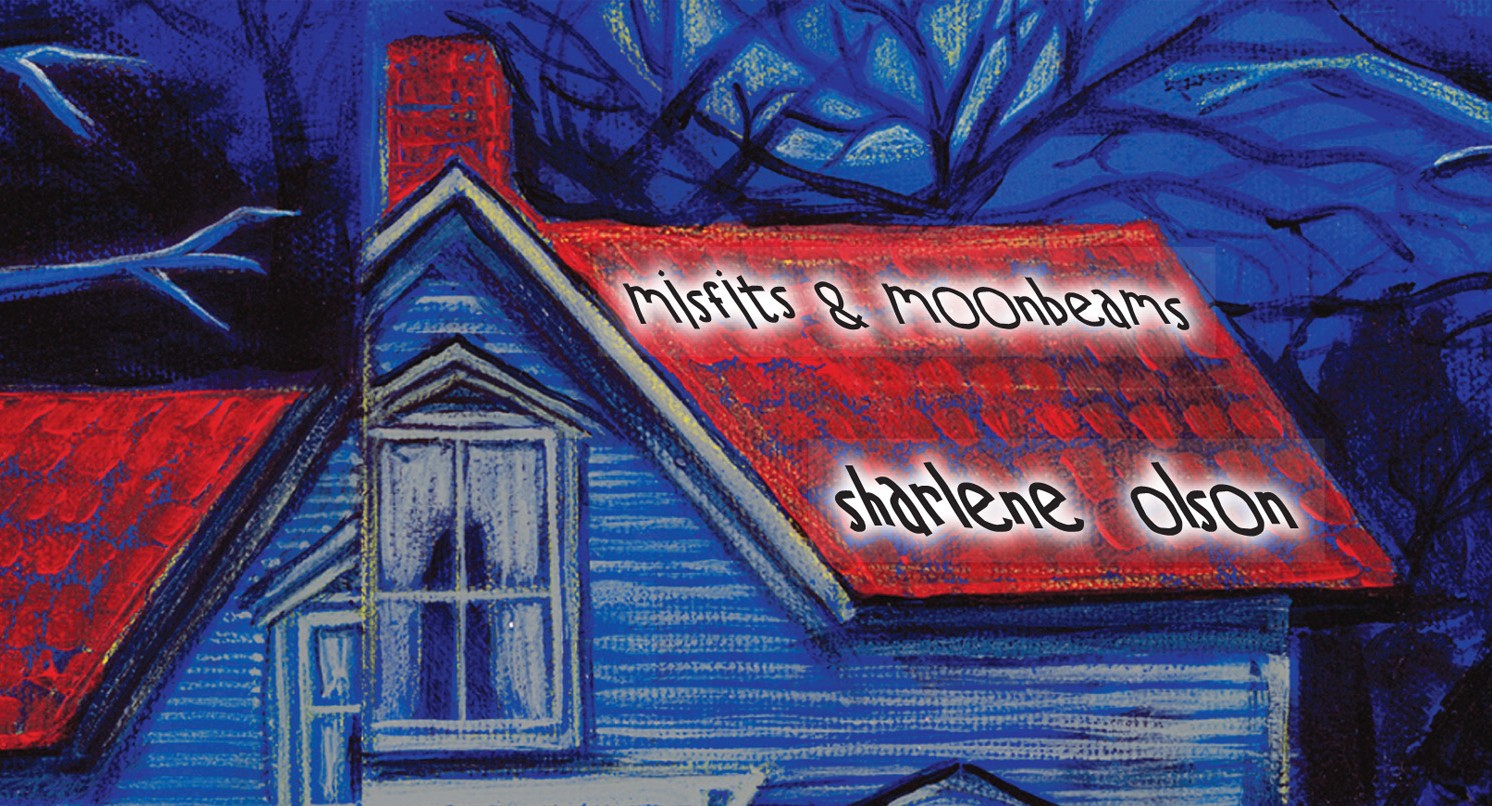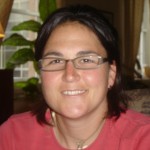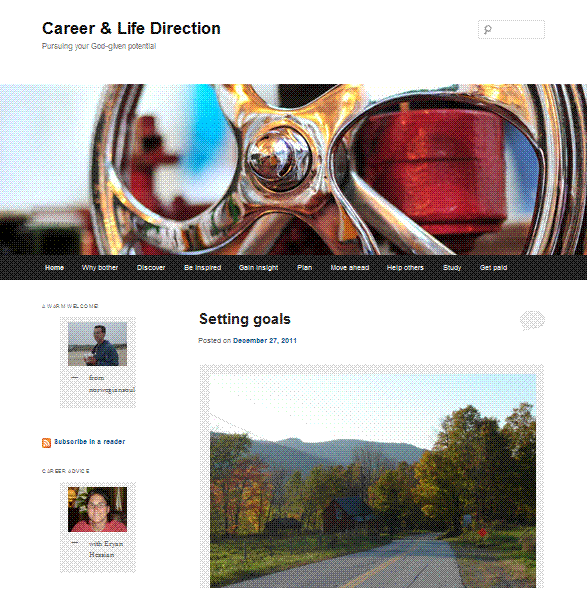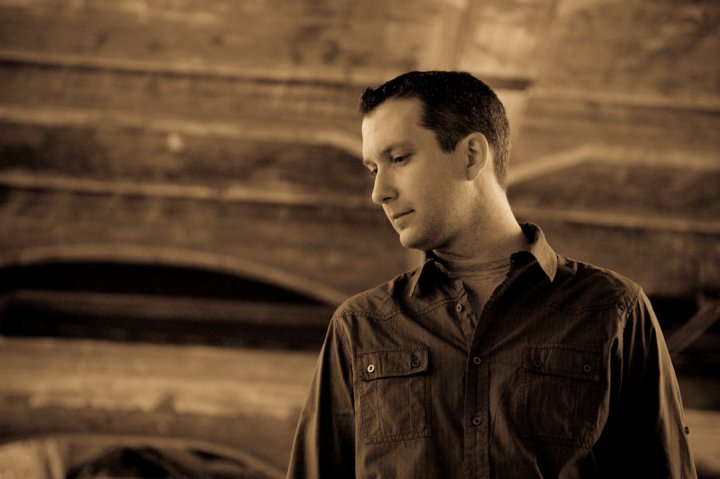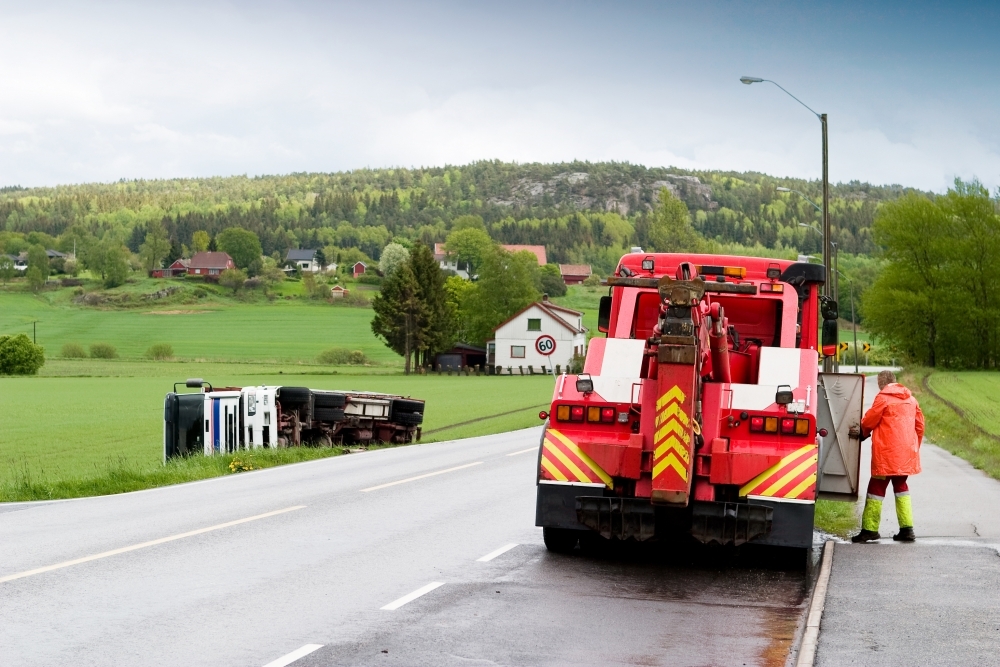Courage and calling
- At January 20, 2015
- By Nathan
- In Career Planning
 0
0
Courage & Calling: Embracing your God-given potential could have been designed with this website in mind. But of course it wasn’t. The author, Gordon T. Smith, wrote the first edition back in 1999 during a sabbatical in the midst of a personal transition. The edition I picked up had been revised in 2011, about the time this online resource began to take shape.
Search and you will find that all sorts of people have been reflecting and talking and writing about these issues for a long period of time. And this, I suspect, will never change. Or at least not any time soon. And each person brings something unique to the discussion.
Gordon grew up in Ecuador and worked in the Philippines before arriving in Canada, and most recently Calgary, where he now serves as the president of Ambrose University. He is ordained with the Christian & Missionary Alliance in Canada, has a Ph.D. from Ateneo de Manila University, and has been working as an academic and administrator in theological colleges for most of his life.
But fear not, this isn’t a dry or dull academic document. It is written, rather, in a straightforward and accessible style and is quite easy to read. As an aside, I found that focusing on this book was more refreshing and enjoyable – and likely beneficial – than staring at a computer screen for the same period of time.
What is this book essentially about? And who will benefit from taking the time to read it?
As the title suggests, the focus is on the courage that each of us will require in order to live out our unique vocation or calling. Courage & Calling is roughly divided in half. The first half is dedicated to a theological vision (for lack of a better phrase) for work and practical insight about the career selection process. The next half begins with a closer look at four specific types of work: business, the arts, education, and religious leadership. What follows is a discussions surrounding five “points of leverage” or rather ways in which we can each increase our effectiveness. This includes: developing courage, continuous learning, emotional resilience, working well with others, and establishing structure and order in our lives.
Of all the points of leverage discussed, Gordon feels that developing emotional resilience is likely the most important one. With this in mind, on page 221, you will read this: “Lack of emotional maturity and resilience will sabotage our lives and vocations.” Strong words perhaps, but nonetheless words that need to be taken to heart.
Unlike other books I have read, and briefly reviewed, this one has a strong emphasis on the organizational side of life. In other words, you will find practical advice here specifically in terms of how to be more effective within a particular organization. At the same time, Gordon emphasizes the importance of carefully selecting where you work. This may sound like a luxury to some. But it makes sense to find a place to work that is a fit with who you are as a person if at all possible. There is also practical advice here related to deciding when it might be a good idea to resign and move on.
One more point to ponder related to content.
Throughout his book, Gordon addresses a number of misunderstandings related to the career selection progress, particularly within the various Christian communities he has been a part of. For example, he feels that personal desire has been misunderstood and often regrettably downplayed. At the same time, he thinks that there has been too much emphasis on meeting immediate needs and not enough instruction on how to determine which needs to meet. For a sense of personal vision and direction is required in order to live a more effective life.
Trying to figure out what do to next? Longing for more of a sense of person direction and focus in your life? Interested in discovering what a “theological vision” for your career might look like? Hoping to move beyond a merely secular take on life? Well then, reading this book would likely be well worth your time.
*Another version of this review is available at Converge Magazine. And here is a brief video by Gordon T. Smith about vocational discernment.
© Career & Life Direction 2015. All rights reserved.
Wally’s private parts
- At January 15, 2015
- By Nathan
- In Career Advice
 0
0
Wally, a mysterious person I have never met, has the best sign advertising a parts store by far. Came around yet another corner on a winding road and there it was: Wally’s Private Parts. We must have passed hundreds of signs on that particular journey, but I will always remember Wally’s. Very entertaining. Over a year has gone by, and we are still laughing.
Thanks for the good memories!
His simple sign was original, creative, funny, memorable, and also very informative. In a moment, anyone driving by knew where to go and who to talk to if their forestry equipment suddenly broke down. Why deal with some generic parts store when you have an excuse to meet an interesting and creative guy named Wally? And with any luck he would answer that earnest knock on his door fully clothed.
Sure, this creative sign was a marketing manuever – a way of getting attention. Obviously, a communication strategy that worked well for a couple of people travelling on by. But this creative presentation also makes me realize that vocational callings can sound unnecessarily dull because of how they are routinely described. Would you agree?
If this is the case, it might partly explain why the decision-making process is such a challenge for some people. After all, why get excited about any occupation if they all sound stale and dry and boring and dull?
So if nothing grabs your attention, perhaps it’s time to rephrase or rethink a few viable options. Try to describe an occupation you might have even briefly considered in the past in a more interesting way. Consider the following examples.
Some time ago, while sitting in a local restaurant, I realized that the people who worked there provided much more than food. Yes, they served excellent meals and they provided a nice atmosphere, etc. But most of all, they provided fuel for life. It’s stating the obvious, but without food and energy everything grinds to a halt in a very short period of time. It’s like running out of gas halfway to your destination.
Notice the contrast: “I am a cook.” vs. “I provide fuel for life.” Both phrases may be true, but which definition or description do you prefer? Which one grabs you?
Another example. Not too long ago, I heard about guy who had a fence building business. Of course there are all sorts of reality TV shows based on the excitement, glamour, and status surrounding such business ventures. Or not. But the way I heard how he described his business made me quite interested. What did he do for a living? He helped people establish boundaries in their lives.
Again, notice the contrast: “I build fences.” vs. “I provide boundaries.” Which phrase makes you feel tired? And which one makes you interested and energized?
Or take what I am doing at this moment: writing a blog post for this website. Every day thousands of website managers and bloggers post articles and create content for their sites. Happens all the time. Over and over again. It’s as common as a curve on a winding road or another sign off to the left. And it doesn’t sound very exciting, does it? But what if this brief description doesn’t accurately describe what is going on?
It’s funny how labels and common phrases can sometimes obscure meaning and make us forget about larger goals. And when that happens, selecting a career becomes even more complicated and unnecessarily dull.
© Career & Life Direction 2015. All rights reserved.
Look closely before you leap
- At January 06, 2015
- By Nathan
- In Career & Life Planning
 0
0
The old adage “Look before you leap” wasn’t coined so cats could get from a comfortable chair to an even more comfortable couch. Anyone who has a cat as a pet knows that these curious – and often crazy – creatures are generally pretty good at finding their way around. Cats just intuitively seem to know what to do and don’t need a lot of instruction.
That being said, the cat in this picture once jumped off a balcony about 10 feet off the ground by accident in an impulsive attempt to catch a passing butterfly. But thankfully, she only tried that once. I guess even cats sometimes need to learn this basic lesson.
But for some of God’s other creatures (i.e. people) life experience is much more complex. Yes, we arrive on the earth with many important capabilities and yet also arrive lacking knowledge in many ways. In order to avoid any confusion, the point of this post is that it will often be necessary for each one of us to aggressively go out and get the knowledge and experience we need.
Please don’t underestimate the amount of time and intentional effort this will take. And please don’t wait too long to get started.
Back in high school, I remember boarding a bus in a bit of a haze with many other students and travelling to the University of Saskatchewan on a career exploration tour. This was a step in the right direction, in terms of gathering more information, but it wasn’t very helpful because the purpose of the trip wasn’t individually specific enough.
Oh yes, some new knowledge was acquired along the way.
What I remember most about that trip was that the agronomy or “Agro” students had a rivalry (sometimes friendly and sometimes not) with the engineers. Not surprisingly, the engineers had the technological upper hand; they had a device capable of firing melon-sized projectiles at unsuspecting agronomy students. But, not to be outdone, the Agros had the tactical advantage of a classroom on the third floor overlooking an important walking path…and access to a water hose.
Which side of the campus war did I want to be on? That was the bizarre question that captured my imagination on the trip back to my home town.
But what is really bizarre, is that I never got around to actually talking to any recent agronomy students or engineering students who had jobs doing what they were trained to do. If I was seriously thinking about becoming an Engineer don’t you think it would make sense to make an effort to talk to one and ask a few questions?
But I never did. Instead, I applied to the College of Engineering (partly because I didn’t know what else to do), got accepted and then privately agonized over whether or not I should go. Looking back, I didn’t make nearly enough effort to get the information I really needed in order to make a wise decision.
Confusion set in for good reason. I didn’t know what I wanted to do partly because I didn’t take the time or put in the right kind of effort to find out.
In case you are wondering, I never did become an Engineer. And for this the world can be eternally thankful. Enough things fall apart as it is. But being a slow learner, I went on to apply to the College of Education without ever talking to anyone who worked as a primary or secondary teacher. What was I thinking!?
Back then, my general approach was to collect as many college catalogues as possible, stare at them in a prolonged and confused state until I ran out of time, and then make a wild leap in a mostly random career direction.
Never again.
© Career & Life Direction 2015. All rights reserved.
My resolution for 2015
- At December 30, 2014
- By Nathan
- In Effective living
 0
0
How’s this for a New Year’s resolution for 2015?
“As 2014 comes to an end, I resolve to focus less on the 10 million or so situations and problems that are completely beyond my control and focus more on specific problems and challenges I can do something about.”
Like all resolutions, this one is obviously much easier to talk about (and write about) than it is to put into action. But wouldn’t your life and mine be different – and better – if we worried less and focused more on positive and concrete action?
More and more, it seems, this world is filled with massive problems. Crazy problems. Unbelievably outrageous and ridiculous problems. And parts of the planet that by and large had been a positive influence now sometimes seem to be part of the problem. Can’t say, for example, that I have a lot of confidence in the American government. But really, what am I going to do to improve the quality of the most influential government in the world?
Keep calm and fly on
Here’s the situation: The American people will have to deal with the American government in the years to come. I wish them well, and plan to focus primarily on my own country and my own life.
Over to Asia. Sadly, as you probably know, Air Asia has been in the news as of late because of a missing plane which was found today in pieces in the Java Sea. When a plane goes down, anywhere in the world, anxiety usually goes way up – up, up, and away. These stories capture our imagination. And stress sets in. Yes, planes crash from time to time. We all know this happens. And when planes crash, people die.
But again, what am I going to do about this tragic situation? Not much. I feel bad for the people on that plane and for the families affected. But what can I do to fix this situation or avoid one like it in the future? Very little. Should I now resolve to walk everywhere? Would that help? Should I boycott flying and paddle my canoe to the other side of the ocean? Would that be the answer? Should I stay home and stay inside and never leave again?
Any other creative suggestions? Just looking for answers and options.
The only real option, as far as I can tell, is to keep on living and keep on flying from time to time because that is what I need to do. Keep calm, as they say, and fly on. That’s the only realistic option.
The idea, of course, isn’t to do nothing about problems and significant perils that wise people routinely make sure they prepare for. This lone resolution, rather, is all about picking appropriate problems, while ignoring millions of others, and then going to work. This suggested resolution raises two important questions: (1) What do I need to pay less attention to in the new year? and, (2) What do I need to pay more attention to in 2015?
How about you? How would you begin to answer these questions? Which pressing problems or projects require your focused and personal attention in the coming days?
© Career & Life Direction 2014. All rights reserved.
Finding your sweet spot
- At October 29, 2014
- By Nathan
- In Effective living
 0
0
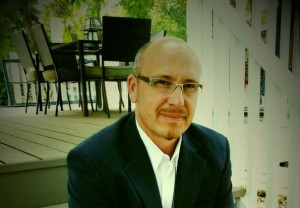 Rob Parkman’s journey towards his calling offers inspiration for others along the way
Rob Parkman’s journey towards his calling offers inspiration for others along the way
Some people would call me an underdog. I came out of a rough working-class background in a remote community where people who succeeded in life were viewed with suspicion and envy.
As a young person my world was full of people who abused substances, acted in violence, were in trouble with the law and lived with a poverty mentality. A job was something that you despised, a necessary evil. There was more month than there was money. You lived for a few moments of escape on the weekend.
I began to build a ramp towards my calling
Anxious to leave my past behind to pursue my calling, I headed off to a Christian college. The teachers and ministry team leaders I was exposed to added more jerry cans of fuel to the bonfire of my dreams and absolutely wrecked me for an ordinary life!
From that point, I experimented with many types of work in an attempt to find my vocational sweet spot. Each of these jobs along the way added another piece of the puzzle until my calling gained more clarity and my personal capacity grew. I would like to say that this took two years, but in reality it took closer to two decades.
When I hit my early forties, I gained a new sense of urgency to find work that was meaningful, significant, enjoyable and profitable. The good experiences I had vocationally pulled me towards my sweet spot, and left me hungry for more. The bad experiences I had vocationally pushed me towards my sweet spot, and ruined my appetite for living for the values of others.
I began to build a ramp towards my calling while I kept up with the commitments of the job I had at the time. This involved exploring and learning everything I could about the areas I wanted to pursue. It involved seeking ways to make sure the bills would be paid once the transition was made. It also involved networking and building mutually beneficial partnerships that would serve us well going forward.
Then the fateful day came. I left my comfortable salary, my group insurance benefits and my employer-matched retirement contributions. It was difficult to walk away from that security into a mode where I would be self-employed, but living in my sweet spot had become a higher value for me than security.
What would possess a family man to take such drastic action?
I’ve asked myself that question many times. I suppose that I did not want to hold my God-given passions in any longer. They were boiling over and I was tired of holding them in! I did not want any more time on the clock to expire before discovering how many of my dreams might become a reality. I did not want to be subject to any person or organization that may delay or deflate my dreams.
At the time, my wife was sensing the same urgency about her calling in music, so the fact that we could journey into the uncertainty together really helped!
What exactly are the passions that were boiling over?
First, I have a heart to see renewal in the church. This brings us before around 5,000 people a year at churches, colleges and camps. Second, I seek to be an encouragement and resource to leaders. I have had the privilege of speaking at leadership events both at home and abroad. Third, I want to multiply my ministry through the lives of young adults that I help to mentor, equip and release. This involves taking a few weeks a year to teach modular courses at a Christian college. Fourth, I desire to see as many children as possible released from poverty in Jesus’ name. This has brought my wife and I into a partnership with Compassion Canada. I also wanted to explore motivational speaking in schools, PhD studies and writing.
As you can guess, this has me spinning many different plates in a given week. I have found that pursuing my sweet spot required far more sustained effort, preparation, risk and focus than I could ever have imagined. At the same time, I have discovered that the process has been more invigorating and rewarding than I could ever have imagined. For me, living in my sweet spot means that I am ‘maxing out’ on the impact I have on the lives of others for the glory of God.
If you are thinking of taking some risks to get into your sweet spot, I encourage you to allow the journey of others to be your inspiration.
God be with you!
Rob Parkman is a speaker & leadership consultant and has spoken in 15 countries. He has written a book called REFUEL: Strengthening Your Soul, Energizing Your Mission that will be released in December 2015. Rob blogs on life and leadership at www.robparkman.com.
Discovering what you like
- At October 25, 2014
- By Nathan
- In Career & Life Planning
 0
0
What do you enjoy? What do you like? And what would you be willing to do for free?
These questions sound simple. And yet, for many they are not easy to answer. But this personal knowledge is necessary in order to move ahead and make good decisions. Without a more clear understanding of what you like, decision-making will seem random or endlessly complicated.
Chances are you will go somewhere and do something – for no particularly reason – or just stand still and stay stuck. And neither option is good.
Trying something for a while, and then reflecting on what you have tried, is one way to work towards a more accurate understanding and finally get to know yourself. And so, I am going to reflect on a few life experiences in order to follow this advice. So here we go.
Going to High School
What did I enjoy the most about the high school years?
Admittedly, high school was not a highlight in my life; I was glad when it was over. But it certainly wasn’t all bad either. In fact, compared to many high schools the Swift Current Comprehensive High School was a very good place to be. It was a fairly large school, about 1000 students, and I am thankful for the opportunity to try out a variety of different subjects and activities.
Through that experience, and others since, I discovered that I enjoy working with words and ideas. Everyone, of course, works with words and ideas but not necessarily in the same way.
English was my favorite class. In some ways, it was very difficult. But I enjoy the challenge of doing research and trying to write and communicate what is true. For I do not like being deceived or manipulated. If I have a core passion, it’s that I really, really, really, really, really (Should I add a few more or have you had enough?) want to know what is true.
Don’t tell me that everything is true or nothing is true or that there is no such thing as truth. Tell me what is true. Truth matters. Reality, and yes there is such a thing, counts. But nowadays, politics trumps truth. It might sound a little crass, but I seem to have arrived on the earth with a very sensitive B.S. detector built into my entire being.
Which subjects did you enjoy in high school? What ideals or noble goals grab your attention more than anything else?
Working in Restaurants
While I grew up on a farm, one of my first jobs – actually during high school – was working in a restaurant. Opa is the German world for grandpa, and this restaurant was called Opa’s.
When the meal was over I came in and cleaned things up, set the tables again, and sometimes did the dishes. A very glamorous job to be sure. Later on, in college, I worked in another restaurant as a waiter. Both restaurants had very good food and were also fairly good places to work.
But, to state the obvious, every restaurant is a social place – an exceedingly social place. There are all sorts of people coming and going. The employees are running here and there. There’s constant conversation in the background. It’s a loud and busy place. Not exactly a peaceful setting that would attract introverts from far and wide to come and reflect on the meaning of life.
This is to say, that this experience helped me realize that I enjoy working primarily alone as opposed to with a lot of people. It’s not that I like to be alone all the time and live in a hermitage. But I do enjoy working by myself. Some people are quite the opposite, and that is fine. The idea is to understand yourself.
Which working environment have you enjoyed the most so far? Where do you thrive?
Living in Community
Over the years, I have been a part of eight or ten (depending how you count) Christian churches or communities. And I have visited many others. It’s not that I was “church-hopping” all the time, but I have moved a lot and lived in a variety of countries and communities.
In my experience, no two churches are exactly alike. While there are all sorts of similarities, there’s also an incredible amount of diversity and variety.
Let’s face it: living in community is not always easy. If you do this for long enough, you will run into a certain amount of trouble and difficulty and hardship. Most of the problems surround making decisions together. But this is hardly unique to the Christian church. And despite the challenges I have experienced, there’s really no place I would rather be. I am very thankful for the Christian church and proud to be a part of the global Christian community.
Looking back, I really enjoy being able to make a meaningful contribution that is unique to who I am. In other words, I like to be involved in some way aside from being person #423 who shows up to sit in chair #322, volunteer in activity #129, and give to this or that particular fund. Stand up, sit down, walk in, walk out, and do it all again next week.
Who wants to feel like a nameless number? Who want to feel like they could leave at any moment and no one would really notice at a personal level?
Most pastors and leaders really want people to be involved, they want to build community, but it is sometimes a struggle to find a way to do that particularly with a large group of people. And for three years I was part of a congregation with over 2,000 people.
In might sound odd, but in a different congregation (a much smaller one) I really enjoyed working on the constitution. The goal was to make the whole enterprise function more effectively. And again, I really enjoyed that. Many people wouldn’t like that at all, but I did. Because I like to organize ideas.
If you are part of a church, what do you enjoy the most? What could you do in order to make the best contribution that you can?
© Career & Life Direction 2014. All rights reserved.
Lessons from the studio and beyond
- At October 08, 2014
- By Nathan
- In Career Planning
 0
0
There are lots of Five-Ways-To-Change-Your-Life-Really-Fast, etc. articles available online. Advice is easier now than ever to come by. Got a problem? Have a question? Just type it in at the top of the screen. Really fast. Pick a popular online sage and search their vast collection of public pondering.
Any yet, when the computer is turned off life still has its challenges; the Internet hasn’t changed everything or even much of anything. And problems remain. Positive change is often elusive and usually takes a very long time.
And with that less-than-inviting introduction, what follows is a brief reflection on a few lessons learned in the midst of a rather large creative project. Well, it was large for us anyway. People make music and CD’s all the time. But Misfits & Moonbeams was the first recording project that I have been a part of. And I only dropped in at the studio briefly at the beginning and the very end.
So what did I learn during that time? And what could I say that might be helpful along the way?
1. Don’t try too hard to please everyone or even yourself
Most people have likely heard most of this before. But it’s worth repeating. No matter what you do, some people will like it and some people won’t. That’s life. For that matter, some days you will like what you do and some days you won’t. Feelings come and go. When it comes to music, there are 18,000 different options and a wide variety of personal preferences. All the opinions and preferences out there and “in there” can make a person crazy.
Pleasing others and pleasing yourself are both important, even very important, secondary goals to keep in mind. If either is completely ignored for an extended period of time there will be serious problems. Each artist has to take the time to find their own voice. And music is made to be listened to and appreciated and enjoyed. But there is much more to life than just trying to please a bunch of people including yourself.
Trying to please God, for example, can come across as being corny and cliché. And it can seem complicated at times. But pursuing what God wants whether in music or art or in life makes much more sense as a primary goal than trying to please incredibly diverse, sometimes fickle, often insecure, and occasionally very confused people.
2. Some decisions involve moral issues but many don’t
Once again, this is nothing new; and yet, this point can be easily forgotten. There were moral issues, matters of right and wrong, involved in this recording project. The main one had to do with what is often known as stewardship. The idea being that what has been given to each person (and each person has been given something) is intended to be used.
To state things personally and plainly, if I don’t do anything with what I have been given I am clearly in the wrong. Or, if I attempt to live as if I have been given what I have not been given, again I am in the wrong. The right thing to do, is to be who I am for the benefit of others, to make sure to discover and then use the specific gifts received from an incredibly generous God.
In case you were wondering, I am not particularly good at writing meaningful music and don’t pretend to be. But my wife is. She just seems to do this all the time. It comes naturally. She really enjoys it. And she has been doing this for years. My abilities and interests have more to do with writing and speaking and organizing things.
That being said, that are probably 10,000 ways each person can go about making use of what has been given. For example, Sharlene didn’t really need to make an album in order to share her music – but that is one method she chose. And most of the creative decisions along the way were largely non-moral issues. It didn’t matter so much whether the percussion came in on the first verse or the second. Either way, life would go on.
3. Searching is required to find people who need what you have
This is to say that promoting yourself and marketing what you have isn’t such a bad thing after all. The problem is that most noble things have been corrupted in this world, and marketing is one of them. But if someone has a good well on their land, it might be a good idea to look for people who could make good use of all that water. Don’t you think?
Somewhere along the way, I read about how much time and effort and money Steve Bell invests in order to let people know about his latest recording projects. It’s a lot. The amount of money he typically spends would surprise you. But most people don’t just intuitively know about everything automatically. It is no offence to say that somebody usually needs to take the time to tell them.
If I don’t take the time to let people know about something I have to offer, who will? Authentic spirituality and a measure of passivity can go together sometimes. The idea isn’t to be pushy. But all too often, there is too much passivity and not enough spiritually motivated and individually specific activity. And yes, I had to learn this the hard way.
So I spent the past three months letting as many people as possible know about Sharlene’s debut CD. Basically, this was my full-time job. And even now, there is work that remains.
© Career & Life Direction 2014. All rights reserved.
A humdinger of a wingding
- At June 07, 2014
- By Nathan
- In Effective living
 0
0
This title actually has nothing whatsoever to do with this post, but these words seemed to fit together so nicely that I thought it best not to pass up the opportunity to string them together in such a form. That, and of course, you’re always supposed to have catchy opening line – right?
It turns out that “wingding” is defined as a wild party in my dictionary, which is too bad. I prefer to define this interesting word as any old gathering of good-natured people who happen to be enjoying themselves and each other.
Quite a few years ago, my wife and I were invited to a Christmas party organized by a group of senior citizens at our church. And that happy event would certainly have qualified. I’ll always remember it. Those old-timers knew how to laugh and have a really good time.
Moving right along.
It goes without saying, that Career & Life Direction is not likely the center of anyone’s universe; I would be worried if it was. And yet, perhaps I should offer a word of explanation for my prolonged absence from this website. It has been quite a while since I have added anything at all to this online resource.
My last article featured seven Christian recording artists in Canada and highlighted the importance of encouragement in their lives. In an attempt to provide more exposure to everyone involved, this project was also eventually published in another online venue. This whole endeavor was a major ordeal, and I with all my other responsibilities, frankly, wore me out.
Working crazy hours and trying to work on all of this at the same time was too much. But such is life. It is humbling to be human and to have limits.
Having said that, I really enjoyed reading the stories each artist sent in and appreciated their involvement. And I hope that you did too. Jennifer Jade Kerr, Dan Bremnes, Marika Siewert, Colin Bernard, Amy Degenais, Stephanie Israelson, and Chelsea Amber have all benefited from having people in their lives who encouraged them to develop their musical potential. And now, we can all benefit from listening to their music.
And while this project was tiring and time-consuming I don’t regret it. For it fit in nicely with my own mission-statement, providing one specific and tangible way to accomplish my stated goal, which is:
“To help restore Western civilization as a light in God’s world by encouraging the development of healthy and growing Christian communities and expanding the influence of Christian individuals and organizations. And, at the same time, to encourage everyone else to develop their own God-given potential for the common good.” Basically, I am trying to help good things grow.
It was my wise wife who suggested, in an off-hand remark, that perhaps I should take on such a project. So I did. And I am glad that I did. She actually recently finished her own recording project, and I now know a little more about what it takes to make good music. Perhaps I will say more about her project another time. But I will say this: Making a CD requires a massive amount of effort.
Making music certainly isn’t easy. Like so many other things in life, you never really know exactly what is involved – or how difficult it is – until you give give it a try. From a distance, things sometimes look easy and straightforward. But usually only from a distance. So it goes.
Your calling and mine will likely require all that we’ve got to give.
© Career & Life Direction 2014. All rights reserved.
Money in my pocket
- At February 10, 2014
- By Nathan
- In Effective living
 0
0
Money talks. The other day, the money in my pocket spoke up and made me feel important. It said how exceedingly special I was in its presence – or so I thought. Reaching deep down, I grasped hold of a fair amount of cash and coins; a little more than usually was there. Rubbing it between my fingers made me feel good. Somehow, I felt more significant than a moment before.
Suddenly…my life mattered.
How valuable is one plain old person without any money in their pocket? What would most people honestly prefer, ten good friends who are poor or $10,000? Wouldn’t most of us take the money and run? After all, more cash on hand does make a difference. And friends with obvious needs can be inconvenient. Prosperity usually makes a person more popular. So it goes.
Money is like a magnet: People are drawn to it.
Don’t we often feel more important around money? But does money feel important being around us? If we all presented ourselves to a huge pile of cash, would this mound of paper mixed with plastic feel (if it actually could feel) more valuable than before? Probably not. Money is obviously worth something; it symbolizes value. Money doesn’t need anyone to feel important. Or so it seems.
But we humans are always searching for something more significant – a car, a career, a popular person, a place, an accomplishment, etc. – to stand beside. This common and sometimes desperate quest for personal value is based upon significance by association; yes, this appears to be how the system works. Most of us must feel that we are lacking in value on our own. How else can we explain all the jockeying for position that goes on down here?
For that matter, how else can I explain what goes on in my own head?
Recently I returned from traveling to Vancouver. It was an enjoyable trip for a variety of reasons. This journey involved taking a bus, flying on a couple of planes, riding the Skytrain in metro Vancouver, taking a taxi and driving my old Toyota. But how does this west coast adventure relate to the significance by association game?
For starters, Vancouver arguably has more status as a city in Canada than most. Vancouver has the ocean, the mountains, fertile land, rugged beauty, a mild climate, and quite a few fancy people with loads of stuff; the Lower Mainland in British Columbia is a very prosperous place. So it felt good to say where I was going.
And guess which means of transportation provided a little lift in the personal value department along the way? That is, until I regained my sense of sanity. Any ideas? It wasn’t the common taxi or the lowly bus or even that ancient import. No, important people fly or travel in style. Don’t you know. Perhaps if I had flown in on a private jet and hopped on a high-speed Skytrain that would have really been impressive.
What was I thinking?
Not that there is anything essentially wrong with this overall technique or approach. The madness has more to do with what or who we choose to associate ourselves with in order to feel important. Hand a young person an Olympic gold metal over in Sochi, and what has really changed in terms of the core worth of this person? Not much. Having a heavy hunk of bullion may signify speed or strength or victory…but so what? Since when does moving really fast or being the best prove that your life matters?
Core worth must be acquired by way of an association or relationship with something or someone else. But what or who?
Here is a provocative statement to ponder: In one sense, human life does not have intrinsic value. To make it more personal, this means that my life isn’t that important all by itself. Neither is yours. And yes, this implies that being a part of humanity – and being associated with all those grand accomplishments over the years – counts for nothing. After all, how could a relationship with lots of people who lack intrinsic value make your life or mine more valuable?
Ultimately, core meaning and value and purpose and worth is found in relationship to God. Deny this, and secondary things suddenly become way too important.
More money in my pocket doesn’t actually make me more important as a person. Life doesn’t work that way. Each one of us is worth much more than any amount of cash.
© Career & Life Direction 2014. All rights reserved.












